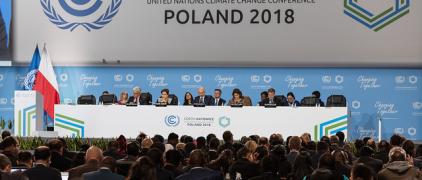
COP 24 in Katowice. Source: UNclimatechange
The 24th Conference of the Parties (COP24 to the UNFCCC) took place from 2-14 December in Katowice, Poland. Expectations were high for governments to make clear commitments and see whether the world still has a chance to fully implement the Paris Agreement.
Especially after the IPCC released its Special Report on Global Warming of 1.5°C in October, where the challenge to protect humanity and nature from the worst impacts of climate change became apparent and critical. It will require strong action across all sectors, with commitment from government, business and society, including rapid and deep cuts to global GHG emissions, which go far beyond the aggregate pledged in current NDCs by 2030. In accordance to this, global investors managing $32tn issued a stark warning to governments at the UN climate summit, demanding urgent cuts in GHG emissions and the phasing out of all coal burning.
However, the IPCC special report became a major source of tension at the talks, with four countries – the US, Saudi Arabia, Russia and Kuwait – delaying the conclusion of a technical plenary by refusing to “welcome” the report. This means that the resolution has been postponed until the next session in 2019.
Nonetheless, a detailed guideline needed for the Paris Agreement to enter force in 2020 was agreed. The “Paris rulebook” covers multiple issues such as how countries should report their GHG emissions or make contributions to climate finance, as well as the rules to voluntary market mechanisms, such as carbon trading.
There were three deliverables championed by the Polish Presidency. The first one is the ‘Katowice Partnership for Electromobility’, which is a dedicated framework to further develop zero-emission transport. The second initiative ‘Solidarity and Just Transition’ envisages reaching targets on climate protection while keeping economic development and workplaces. The third delivery ‘Forests for Climate’ seeks to ensure that the global contribution of forests and forest products is maintained and further supported and enhanced by 2050. Finally, Canada and UK pledged to partner with the World Bank to assist countries transition from coal to clean energy.
And while the outcome of these talks sparked reactions of frustration, revealing a “fundamental lack of understanding” of our current crisis by some countries, the “Paris Agreement is proving to be resilient to the storms of global geopolitics” as stated by Manuel Pulgar-Vidal (Leader of WWF’s Climate and Energy Practice).
The idea of a “just transition” highlighted by the ongoing “gilet jaunes” protests in France, which in turn was sparked by a controversial fuel eco-tax (since dropped), prompts us to better understand how to craft climate policies that are both transformative and ambitious while being sustainable and politically durable.